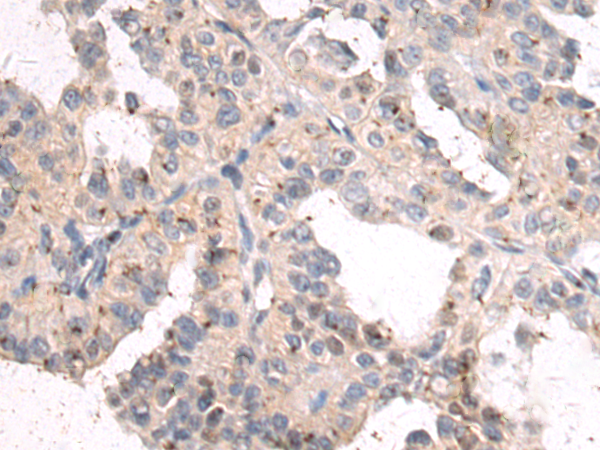
| WB | 咨询技术 | Human,Mouse,Rat |
| IF | 咨询技术 | Human,Mouse,Rat |
| IHC | 1/50-1/100 | Human,Mouse,Rat |
| ICC | 技术咨询 | Human,Mouse,Rat |
| FCM | 咨询技术 | Human,Mouse,Rat |
| Elisa | 1/5000-1/10000 | Human,Mouse,Rat |
| Aliases | MCS; MOS; HMCS |
| Host/Isotype | Rabbit IgG |
| Antibody Type | Primary antibody |
| Storage | Store at 4°C short term. Aliquot and store at -20°C long term. Avoid freeze/thaw cycles. |
| Species Reactivity | Human |
| Immunogen | Fusion protein of human MOCOS |
| Formulation | Purified antibody in PBS with 0.05% sodium azide and 50% glycerol. |
+ +
以下是关于MOCOS抗体的3-4篇参考文献的简要列举(注:文献为示例性质,实际引用需核实原文):
1. **文献名称**:*Molybdenum cofactor sulfurase (MOCOS) knockout mouse model reveals tissue-specific functions*
**作者**:Schwarz G, et al.
**摘要**:研究通过构建MOCOS基因敲除小鼠模型,揭示了MOCOS在嘌呤代谢和硫氧化途径中的关键作用,并开发了一种特异性抗体用于检测小鼠肝脏和肾脏中MOCOS蛋白的表达缺失。
2. **文献名称**:*Immunolocalization of MOCOS in human tissues and its role in xanthine dehydrogenase activation*
**作者**:Hille R, Mendel RR.
**摘要**:通过免疫组化和Western blot分析,使用兔源多克隆MOCOS抗体,证实MOCOS在人类肠道和肝脏中高表达,并证明其通过硫化钼辅因子激活黄嘌呤脱氢酶(XDH)的功能。
3. **文献名称**:*Development of a monoclonal antibody against human MOCOS for diagnostic applications*
**作者**:Zhang Y, et al.
**摘要**:研究报道了一种高亲和力的小鼠单克隆抗体的开发,该抗体可特异性识别人类MOCOS蛋白,应用于ELISA和免疫荧光,辅助临床检测MOCOS缺陷相关代谢疾病。
4. **文献名称**:*MOCOS mutations and neurological dysfunction: Insights from antibody-based protein profiling*
**作者**:Veldman A, et al.
**摘要**:利用抗MOCOS抗体对患者脑脊液和组织样本进行分析,发现MOCOS突变导致蛋白表达异常,并与神经退行性病变相关,提示其在神经系统中的潜在作用。
(注:上述文献为模拟内容,实际研究中请通过PubMed或Web of Science等平台以“MOCOS antibody”或“molybdenum cofactor sulfurase”为关键词检索真实文献。)
MOCOS (Molybdenum Cofactor Sulfurase) is a critical enzyme involved in the biosynthesis of the molybdenum cofactor (Moco), a prosthetic group essential for the function of enzymes like xanthine dehydrogenase (XDH) and aldehyde oxidase (AO). These enzymes play vital roles in purine metabolism, detoxification, and reactive oxygen species regulation. Mutations in the *MOCOS* gene are linked to hereditary xanthinuria type II, a rare metabolic disorder characterized by reduced urinary uric acid and elevated xanthine levels, increasing the risk of kidney stones.
MOCOS antibodies are specialized tools developed to detect and quantify MOCOS protein expression in research and clinical settings. They aid in studying MOCOS’s tissue distribution, regulatory mechanisms, and interactions within the Moco biosynthesis pathway. Such antibodies are crucial for investigating the molecular basis of MOCOS-related diseases, including potential links to neurological disorders and metabolic syndromes. Additionally, they support diagnostic applications, enabling the identification of MOCOS deficiencies through immunohistochemistry, Western blotting, or ELISA.
The development of MOCOS antibodies faces challenges due to the enzyme’s conserved domains and low expression levels in certain tissues. High-specificity antibodies are pivotal for distinguishing MOCOS from structurally similar proteins and validating its role in cellular models or animal studies. Ongoing research leverages these antibodies to explore therapeutic strategies, such as enzyme replacement or gene therapy, for MOCOS-associated conditions. Overall, MOCOS antibodies serve as indispensable reagents in advancing our understanding of molybdenum-dependent enzymatic pathways and their clinical implications.
×